Dan Orlovs is just 20 years old, but he has spent months waking up with aches in his legs. Sleeping on the streets of Dublin with little more than cardboard as insulation is not good for your body.
“It’s extremely dangerous. If you’re sleeping rough, you couldn’t be more exposed as a human being in modern society,” said Mike Allen, the director of advocacy at Focus Ireland.
Dan has contended with more than most people his age: at the age of 10, able to say little more than his name and age in English, he moved to Ireland with his mother. At 15 years of age, Dan became homeless and later estranged from his mother. He spent the next four years staying with friends, sleeping on couches, before leaving Kildare to live on the streets of Dublin in July 2020.
Nothing could have prepared Dan for his first night sleeping rough in a doorway close to Store Street Garda Station in Dublin’s north inner-city.
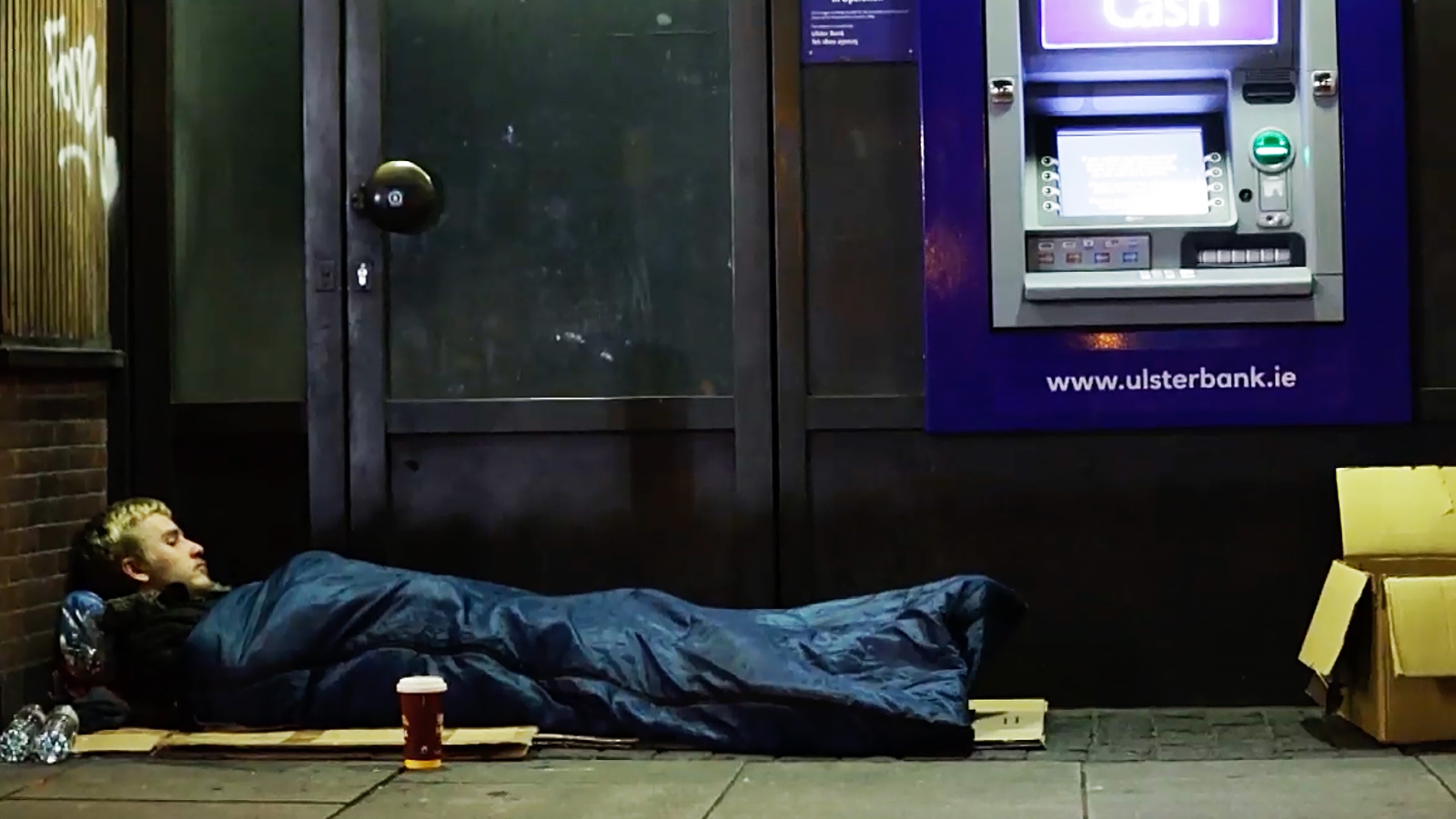
Dan Orlovs left Kildare to live on the streets of Dublin in July 2020
“At the start – the first two to three weeks in Dublin – I wouldn’t beg,” Dan told RTÉ Investigates. “Then, three weeks in, I said to myself: ‘I’m sleeping in a doorway. I’m not washing myself. It’s no harm.’ And then I started begging.”
Some 56 homeless people died in Dublin in the first 11 months of 2020.
Over the course of several months, RTÉ Investigates set out to examine what life is like sleeping rough in Dublin. It is a multifaceted and complex issue.
The number of rough sleepers in the city fluctuates. The most recent count by Dublin Simon Community found 139 people sleeping rough over one week in November.
Those that are sleeping rough are supposed to be able to get an emergency hostel bed by ringing a freephone number operated by the Dublin Region Homeless Executive (DRHE). These beds are for those in crisis.
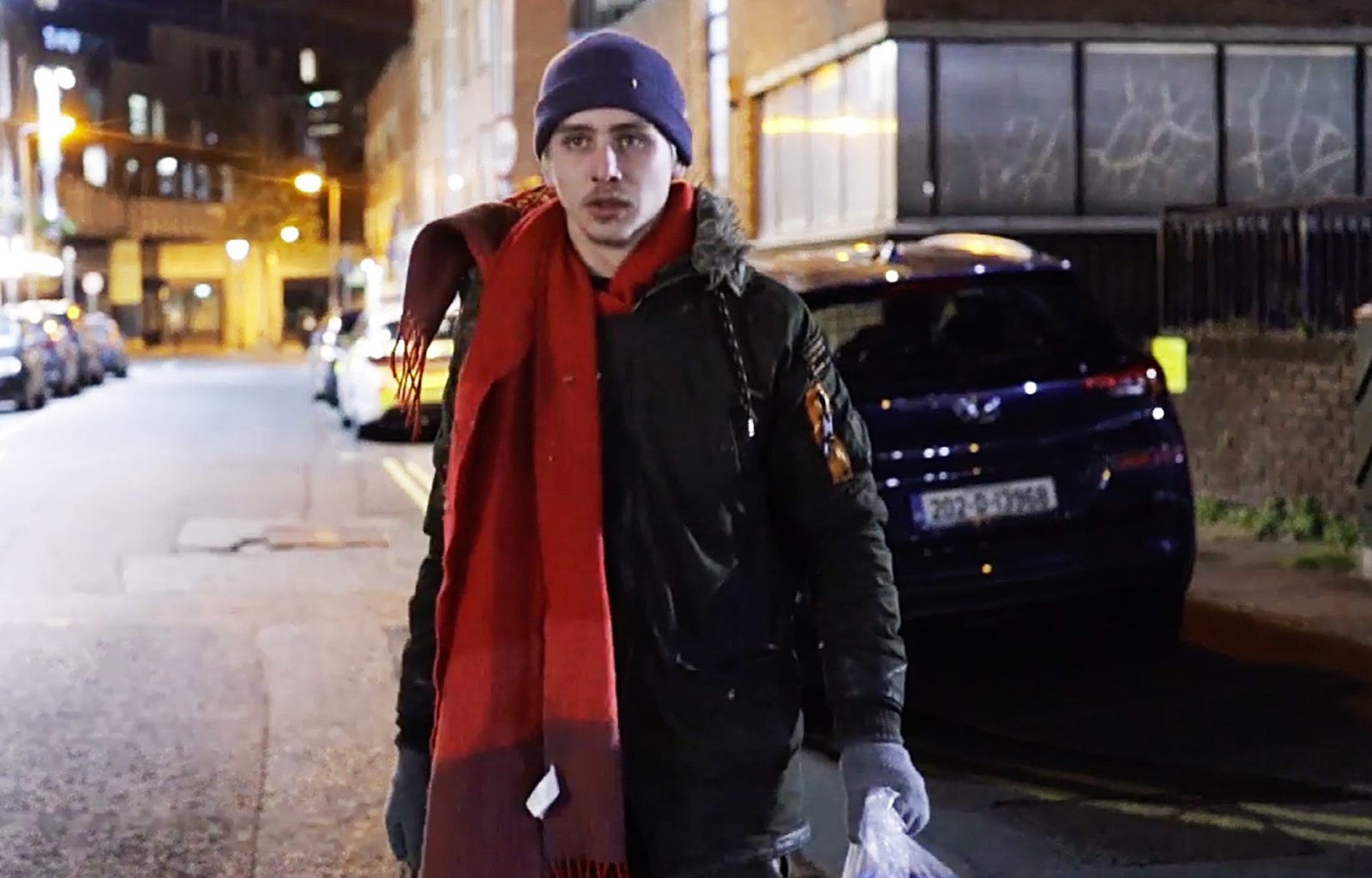
When Dan Orlovs arrived in Ireland at the age of 10, he was able to say little more than his name and age in English
But our investigation revealed that rough sleepers are sometimes refused entry into emergency hostels, despite a pledge by the Minister for Housing, Darragh O’Brien, that nobody would be turned away.
As part of our research, RTÉ Investigates surveyed 80 people who sleep rough or who use emergency hostels.
Some 27% of the rough sleepers we spoke to say they were turned away from an emergency hostel bed at different times since the pandemic began last year.
Throughout July and October last, Dan repeatedly phoned the DRHE to get a hostel bed. Feed Our Homeless, a non-profit organisation that provides support to homeless people in Dublin, also phoned on his behalf.
“We tried to secure emergency accommodation for him, but because he didn’t fit the criteria, that he wasn’t from Dublin, he was basically given a sleeping bag,” said Tony Walsh, the founder of Feed Our Homeless.
Many homeless people do not want to return to their home county, Mr Walsh said.
We need your consent to load this Datawrapper contentWe use Datawrapper to manage extra content that can set cookies on your device and collect data about your activity. Please review their details and accept them to load the content.Manage Preferences
“People come from their counties for different reasons. Whether it’s family breakdown, whether it’s fear, there are different reasons why people come from different counties,” he said.
“Why did they leave that county in the first place? Some of them don’t want to go back to that county.”
Trying to survive on the streets on his own is affecting Dan Orlovs emotionally.
“I’m embarrassed, because I’m sleeping on the streets in front of an ATM, in a sleeping bag on the street,” he told RTÉ Investigates.
“I’ve had mental health problems before. It’s no good for your mental health – especially when thinking every day, just because what are you doing with yourself?”
Dan had smoked cannabis before, but he started smoking heroin for the first time soon after he began sleeping rough on the streets of Dublin, partly because it relieved a painful abscess in his mouth.
But taking drugs also helps him while away the days on the streets.
“It makes you feel better. It helps you,” Dan said. “When you are sober, you think about everything. It’s just hard to deal with everything when you’re sober. It’s easier to use drugs and have a laugh and relax – and forget about everything for a couple of hours.”
We need your consent to load this Datawrapper contentWe use Datawrapper to manage extra content that can set cookies on your device and collect data about your activity. Please review their details and accept them to load the content.Manage Preferences
Dan Orlovs is far from alone in becoming addicted to heroin only after becoming homeless. Our survey revealed that many homeless people did not experience drug addiction before becoming homeless.
Some 48% of the 80 people surveyed, who either sleep rough or use emergency hostels, said they were not addicted to drugs before becoming homeless.
Of those who weren’t addicts before ending up on the streets, 50% ended up with addiction problems, including heroin and crack cocaine.
Among the younger age groups, the rate of addiction is even higher: in the 18-to-34 age bracket, 71% turned to drugs, despite no previous history of drug addiction.
Heroin and alcohol were the most common drugs, followed by cannabis, prescription drugs, crack cocaine and cocaine.
“It’s shocking,” said Mr Allen. “Very often, we look at people who are homeless and we see the drug addiction they have, and we think that that’s the cause of their homelessness.”
We need your consent to load this Datawrapper contentWe use Datawrapper to manage extra content that can set cookies on your device and collect data about your activity. Please review their details and accept them to load the content.Manage Preferences
“But, in actual fact, many of the problems that people who are homeless have are consequences of their homelessness – and just the sheer misery and the sheer mental pressure of living in circumstances where you have no home and the security that should go with a home,” he said.
Being homeless also has the potential to exacerbate existing addiction issues, with two-thirds of the survey respondents reporting that their addiction worsened when on the streets.
While 75% said that they had mental health issues such as depression and anxiety before becoming homeless, 70% said their mental health issues had worsened since they lost their home.
“One of my biggest fears is that my addiction is going to get worse in a couple of months. My biggest fear is what’s going to happen the next three months if I don’t start doing something tomorrow,” Dan told RTÉ Investigates in October.
Dan’s aspirations are modest. All he wants is a home, his own bed, a job, and “something to look forward to every day,” he said.
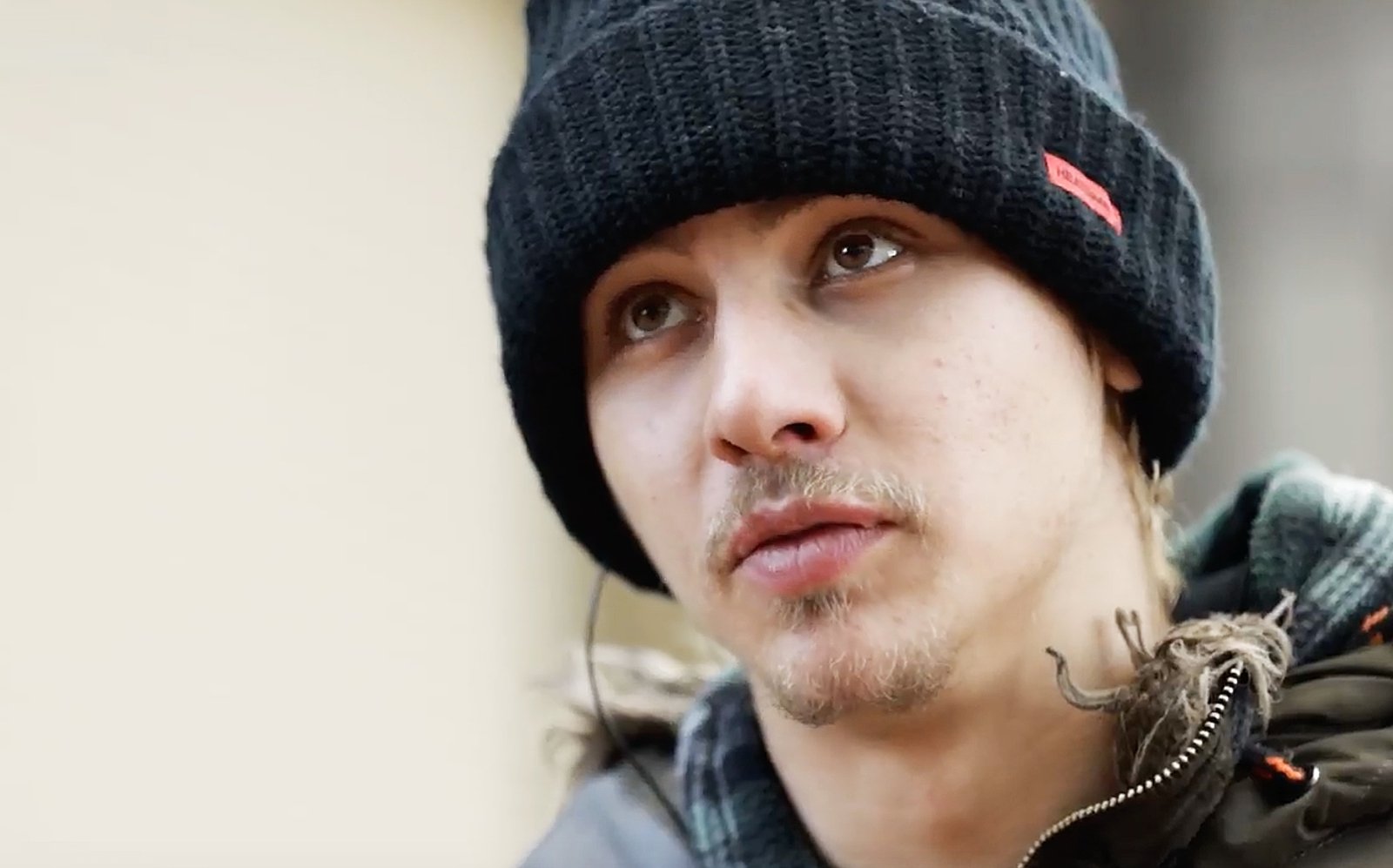
All Dan Orlovs wants is a home, his own bed, a job, and “something to look forward to every day”
There are complex reasons why people end up with no home to go to.
As part of our survey, which was conducted in association with Amárach Research, RTÉ Investigates asked participants if there was a specific reason for ending up on the streets.
Some gave multiple reasons, with 33% of people citing addiction and almost 23% citing a family breakdown or argument. Some 16% had lost a job, 13% said their relationship had ended, while 10% said their landlord upped their rent or that they had been evicted.
A similar number cited grief – in that someone close to them had died – and a further 9% said they had mental health issues.
“They’re a hugely deprived and vulnerable and tragic group,” psychiatrist Patricia Casey told RTÉ Investigates.
“They have, in some respects, a very similar history – beginning usually, but not always, with some type of physical and sexual abuse, or sometimes neglect, emotional neglect, in childhood.”
We need your consent to load this Datawrapper contentWe use Datawrapper to manage extra content that can set cookies on your device and collect data about your activity. Please review their details and accept them to load the content.Manage Preferences
39-year-old Natalie is one of the people who ended up on the streets because of her addiction. She started taking heroin when she was a teenager.
Natalie has been living in a tent beside the Grand Canal in Dublin for the last few months.
“I just want somewhere to call home – somewhere I can say ‘this is my base, this is it, I’m here, this is me’,” Natalie told RTÉ Investigates.
“Look around: it would change my life immensely. No words can explain it,” she said. “Security. That’s all I need – is a bit of security.”
Sleeping rough is affecting Natalie’s mental health, she said.
“It is a consequence of homelessness that it undermines peoples’ mental health – because it undermines their humanity and undermines their spirit. It undermines what we believe it is to be human,” said Mr Allen.
Because Natalie is from Dublin, she can get an emergency hostel bed. But, after experiencing hostels first-hand, she prefers to live on the streets.
“You should feel safe [in hostels], but you can’t – from being mugged to being hopped on, to being attacked. People pushing drugs on you,” she said.
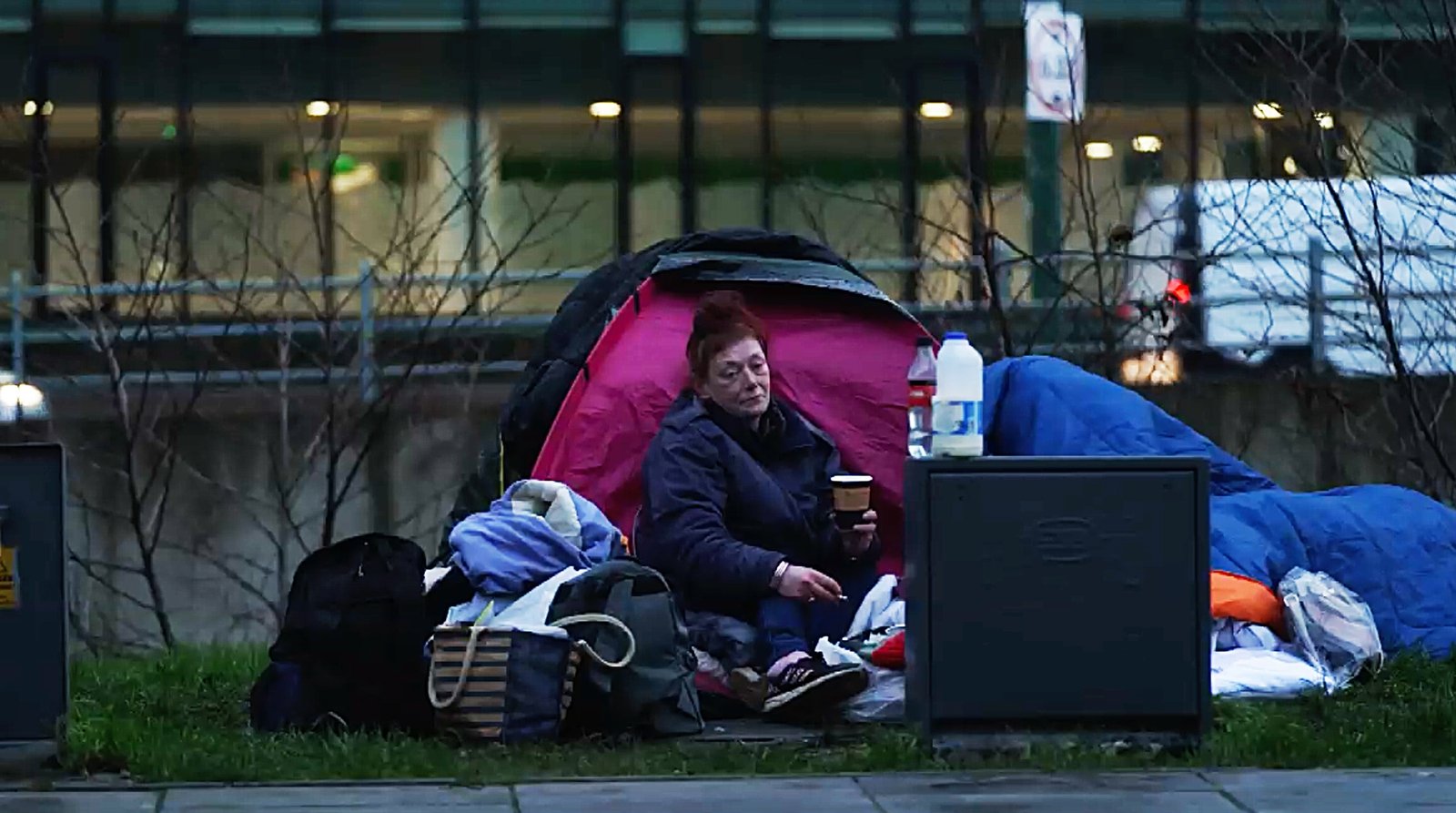
39-year-old Natalie has been living in a tent beside Dublin’s Grand Canal for the last few months
“It’s not a nice place to be,” Natalie said, referring to the tent in which she sleeps. “But this is my little heart where I feel safe now. It’s the only place to be, and it’s safer than some of the hostels.”
Hostels remain a key and a costly component of the government’s response to homelessness.
In 2016, the DRHE spent almost €10m on private emergency hostels. By 2019, this spend had risen to almost €22m.
In response to a Freedom of Information request from RTÉ Investigates, the DRHE refused to provide a breakdown of this spending, citing commercial sensitivity.
“It would be very beneficial if there was greater clarity on where that money was going,” said Mr Allen.
While the number of emergency shelters has doubled in recent years, Mr Allen said that what homeless people need is a home.
“We need to move away from a view that building a larger and larger homeless sector with more and more homeless shelters is in any way going to bring us closer to an answer,” he said.
Bob Jordan of the DRHE agreed that homeless people needed to be offered longer-term housing.
All our programmes are about managing it. We are not – so far – committed to ending homelessness
“Obviously, that’s where the priority has to lie,” said Mr Jordan. “But, in the meantime, while that housing is not available, we obviously have to protect people in hostels.”
Respondents to our survey found that 55% of homeless people had an issue with privacy in hostels. A similar proportion had issues with noise levels, while around a quarter had issues with either staff or cleanliness.
“It is very challenging to run a hostel with 50 to 60 people, some of whom have mental health issues, some of whom have drug addiction issues, and so on,” said Mr Allen.
“So, it requires you to have very strict rules to keep it safe. But the very strict rules in themselves create a culture within even well-run hostels which is very problematic for people,” he said.
Local authorities have been conducting inspections of hostels since February 2019. The authorities refused to provide details of these inspections to RTÉ Investigates under the Freedom of Information Act.
“Where they can be made public, they should be,” the Minister for Housing, Darragh O’Brien, told RTÉ Investigates. “I haven’t, and I don’t, have any difficulty with that.”
But Jordan described them as “internal reports” that are designed to assist the DRHE with their relationships with private hostel operators. “Their purpose is not to be published publicly,” he said.
We need your consent to load this Datawrapper contentWe use Datawrapper to manage extra content that can set cookies on your device and collect data about your activity. Please review their details and accept them to load the content.Manage Preferences
Near the end of October, Dan Orlovs decided to stop using heroin completely – what’s known as going “cold turkey”.
“When you’re coming down off heroin, you can go to a doctor and get prescribed methadone – but then you’re hooked on meth. But with cold turkey, you’re fighting the sickness yourself,” Dan said.
Fever, diarrhoea and body aches are just some of the symptoms of heroin withdrawal. Managing this when on the streets, without access to a bed or the basics of a toilet, shower or heat, is very difficult.
But because his last registered address was in Kildare, Dan is once again refused a bed in a Dublin hostel.
“To be helped out by us, you need to have some local connection to Dublin. We are not allowed to help people from Kildare,” an operator tells him on the phone.
Rough sleepers from outside Co Dublin being denied access to an emergency hostel bed in the city has caused some controversy.
On 7 December, Minister O’Brien told the nation on RTÉ’s Morning Ireland that nobody is being denied a hostel bed in Dublin.
“A local connection is not necessary,” he said. “I’ve instructed my own team there that it is not necessary. If people need to seek emergency accommodation and are seeking emergency accommodation, they are not turned away.”
Four days later, RTÉ Investigates took to the streets to test this.
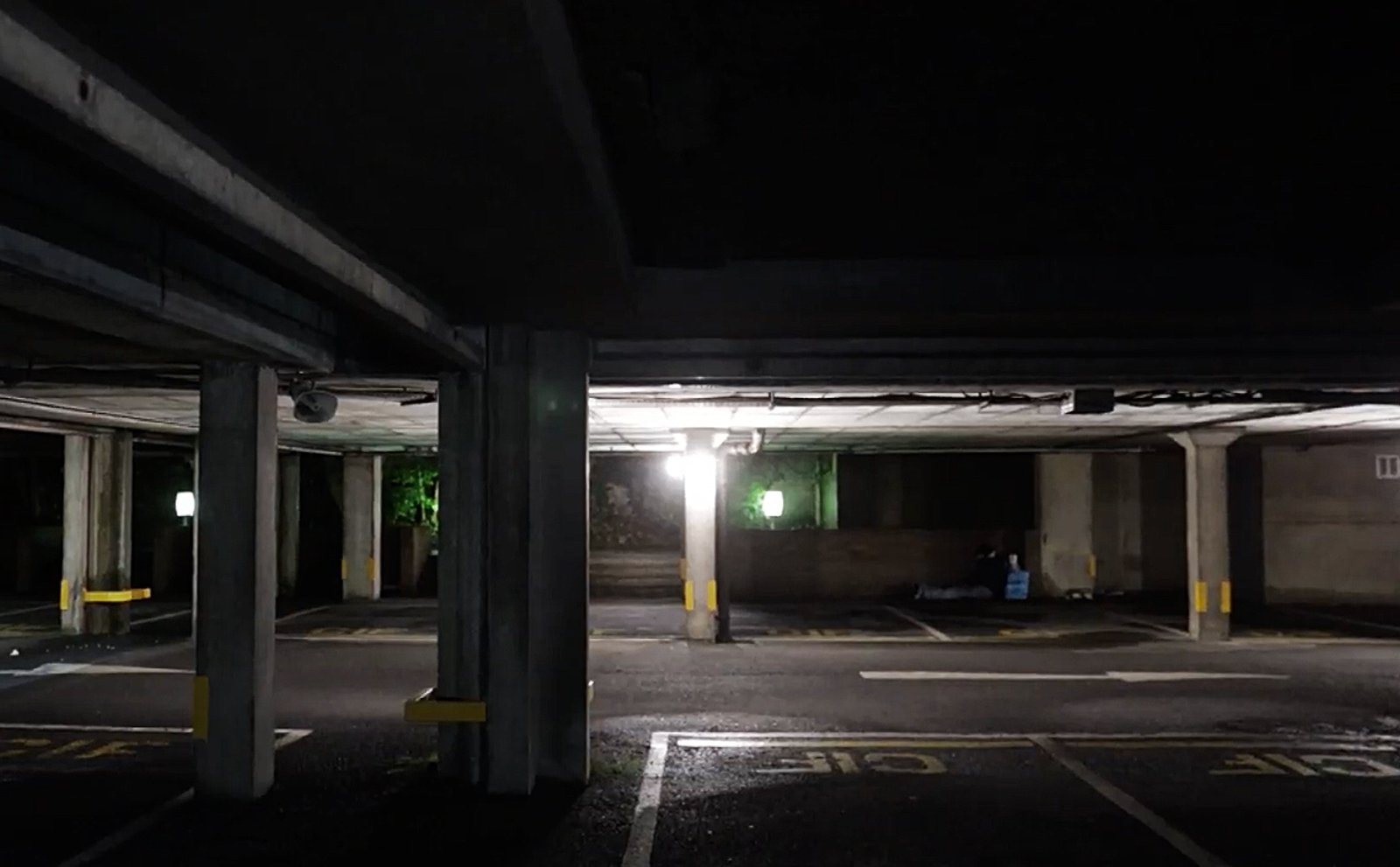
Joe Nolan has been living on a sleeping bag in a secluded area of a multi-storey car park for months
Carlow man Joe Nolan, 59, has been homeless since 2011, when he left prison after a heroin dealing conviction.
Joe has been living on a sleeping bag tucked away in a secluded area of a multi-storey car park in Dublin for 18 weeks.
But an operator from the DRHE brusquely informs Joe that, because his last registered address is in Carlow, they cannot do anything for him.
“Hang on a minute now. Excuse me, in fairness, you haven’t rung here before,” the operator said. “Exactly that’s the problem here? I don’t need the story.”
“You’ve registered in Carlow … and now you’re in Dublin, so we can’t do anything, unfortunately,” he continued – before hanging up on Joe.
That night, there were 75 beds free in emergency hostels in the city.
On a second night, another homeless man, who didn’t want to be identified, was also refused a bed because he was from outside Dublin.
“I would firstly apologise to those two gentlemen. That shouldn’t have happened,” Minister O’Brien told RTÉ Investigates.
“Secondly, what I would say is I’ve been very clear: there is no barrier to any person who needs emergency accommodation,” he said.
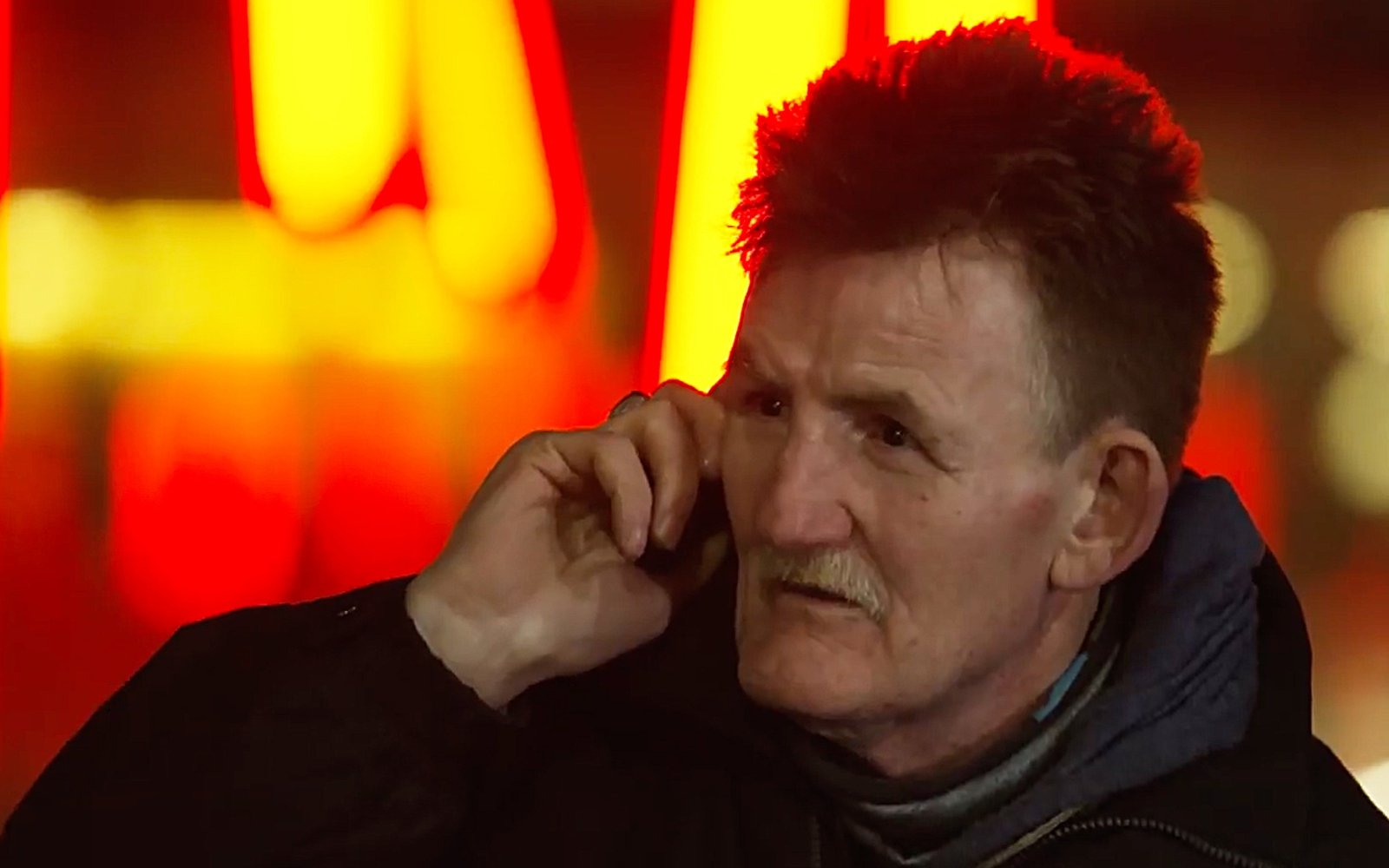
Though there were 75 beds free in emergency hostels in Dublin, 59-year-old Joe Nolan was refused a bed in December because he is from Carlow
“If someone phones up and seeks emergency accommodation in Dublin, or indeed in any of our regional cities, local connection is no barrier to them accessing that emergency accommodation.”
While Mr Jordan said that the DRHE was taking the letter from the minister “extremely seriously” – and reviewed every request on a “case-by-case basis”, he said that they were “not responsible for providing homeless accommodation for everybody in the country.”
For Focus Ireland, the issue is that homelessness is no longer viewed as a problem that can be solved.
“All [the country’s] programmes to do with homelessness are about managing it,” said Mr Allen. “We are not – so far – committed to ending homelessness.”
Other cities have vastly different approaches. Helsinki, a city of a similar size to Dublin, has drastically reduced the numbers who sleep rough and who use temporary accommodation.
“In Finland, it has been a systemic change. It’s now based on permanent housing and not on temporary accommodation, which doesn’t end homelessness. It’s a band-aid,” said Juha Kaakinen, the CEO of Y-Foundation, a non-profit organisation that provides homes to thousands of formerly homeless people in Finland.
“The services should be based on permanent housing and adequate support,” he said.
Finland’s housing model is based around providing long-term homes quickly, so people then have the stability to deal with their other, often more complex, problems.
“When people get settled in their own home, they have better capabilities to deal with the other issues,” Mr Kaakinen said.
There is money available and there could be other ways to use that money. I simply don’t understand why that’s not being done
“Mental health or addiction quite often dissipate when people move into their own accommodation,” said Prof Eoin O’Sullivan, a researcher from Trinity College Dublin who has published widely on issues relating to homelessness.
“The skills required to survive in a tent on the side of the canal or in a large congregate shelter are very different from the skills that I need to survive in my own private accommodation,” Prof O’Sullivan said.
Like Finland, Ireland also has a housing-first policy, but on a much smaller scale.
“[In 2020], we’ve had nearly 900 people exit homelessness and [moved] people who were in hostels into permanent accommodation,” said Minister O’Brien.
“And that’s a very good thing. But do we need to do better? Always, we’ll need to do better,” he said.
“We have the same commitment that Finland has,” said Mr Jordan. “We might be a few years behind. The issue is the supply of one-bed housing.”
“We won’t rest until every person who is on the street get this programme.”
While it is difficult to obtain an exact figure, it costs between €35,000 and €40,000 a year to keep someone in emergency accommodation in Dublin, according to Prof O’Sullivan.
“So, even if you don’t buy into the humanitarian argument, there’s equally an argument that you can say that, well, this is actually just more cost effective,” he said.
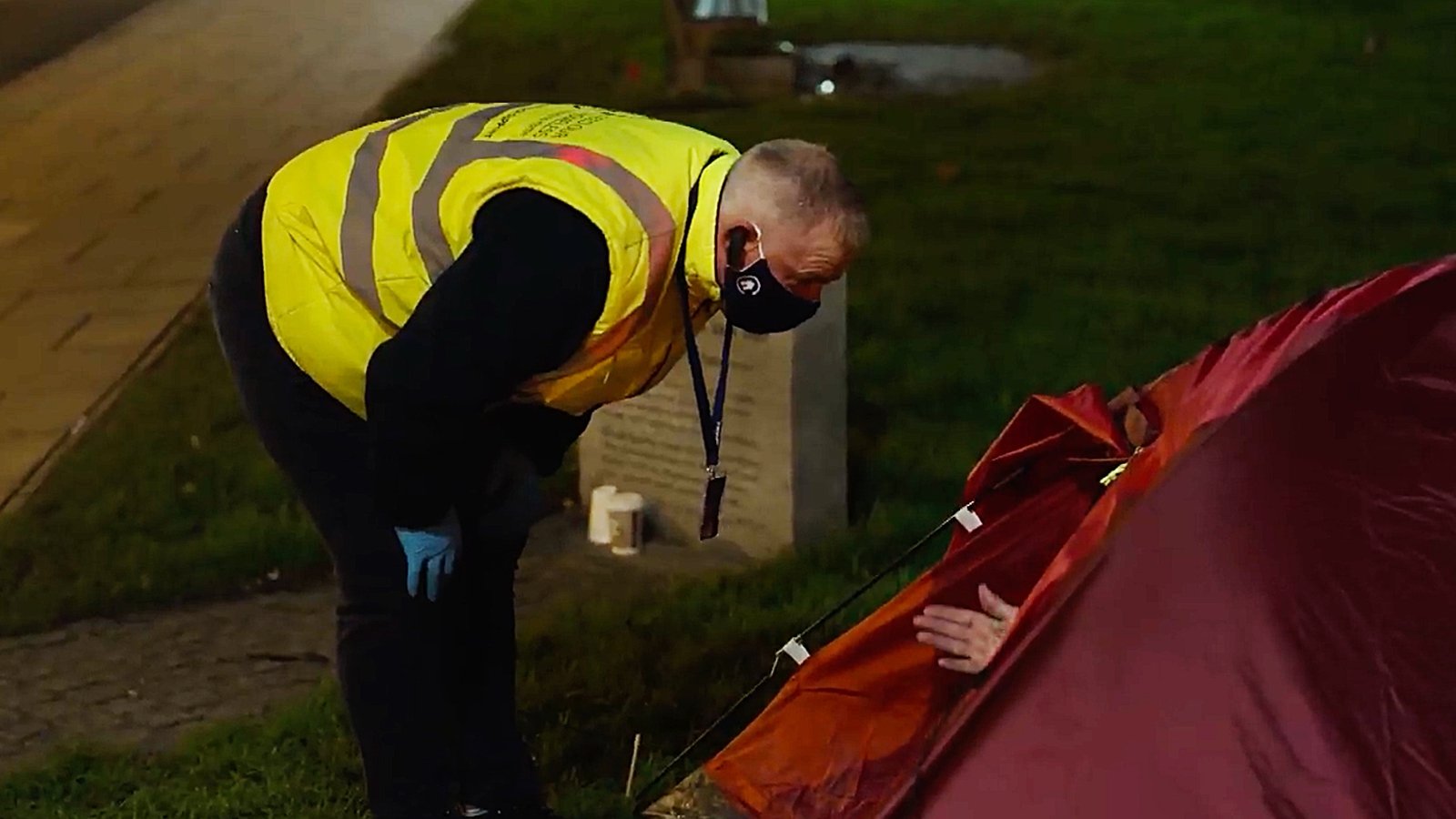
Tony Walsh is the founder of Feed Our Homeless, which provides support to homeless people in Dublin
Mr Kaakinen said that the experience in Finland bears this out. Y-Foundation research found that giving a homeless person permanent accommodation can result in cost savings of at least €15,000 per person each year.
But Minister O’Brien said that the money spent on emergency hostels was a “necessary use of money at the moment.”
“I hope that we get to a stage where it’s not necessary to do that, but it is necessary and, no, it’s not a waste.”
“I simply think that that’s not money used wisely. It only shows that there is money available and there could be other ways how to use that money. I simply don’t understand why that’s not being done,” said Mr Kaakinen.
Amid his withdrawal from heroin, Dan Orlovs concluded that securing a hostel in Kildare was his best option.
During his time in the hostel, Dan was offered a methadone maintenance programme on several occasions. But he declined, because he is worried that he would just swap his heroin addiction for another.
Without these vital supports, we’re keeping people on the rat-wheel of homelessness
Within days, and partly due to the boredom of hostel life, Dan succumbed to temptation.
But unlike on the streets, where you often have to seek out heroin, Dan found that some residents in the hostel were selling illegal drugs.
“If you’re trying to get off them it wouldn’t be the best place to go to stay off drugs,” he said. “The fact that it was easy to get them was a very big temptation.”
Under the National Quality Standards Framework, residents of homeless shelters are assigned so-called key workers, who help with the often complex and bureaucratic systems that one must navigate in order to exit homelessness.
While Dan was assigned a key worker at his initial induction, it was two weeks before his first formal intervention meeting took place.
The RTÉ Investigates survey found that over 80% of the hostel users who responded to our survey were not given access to a key worker.
“That’s an absolute failing. Everybody should have a key worker. The key worker should have supports and targets and should be moving people out of homelessness as quickly as possible,” said Mr Allen.
Despite the temptations and trying to go cold turkey, Dan continues to try and improve his situation.
In December, more than a month after first entering the Kildare hostel, Dan secured a temporary Christmas job.
But living in a hostel is difficult for those trying to hold down a job. Dan’s hostel is in the middle of the country. While the hostel provides a shuttle bus, Dan cannot avail of the service because of his work timetable. Sometimes he can get a lift from hostel staff, but some mornings he must make a 90-minute journey to his job on foot.
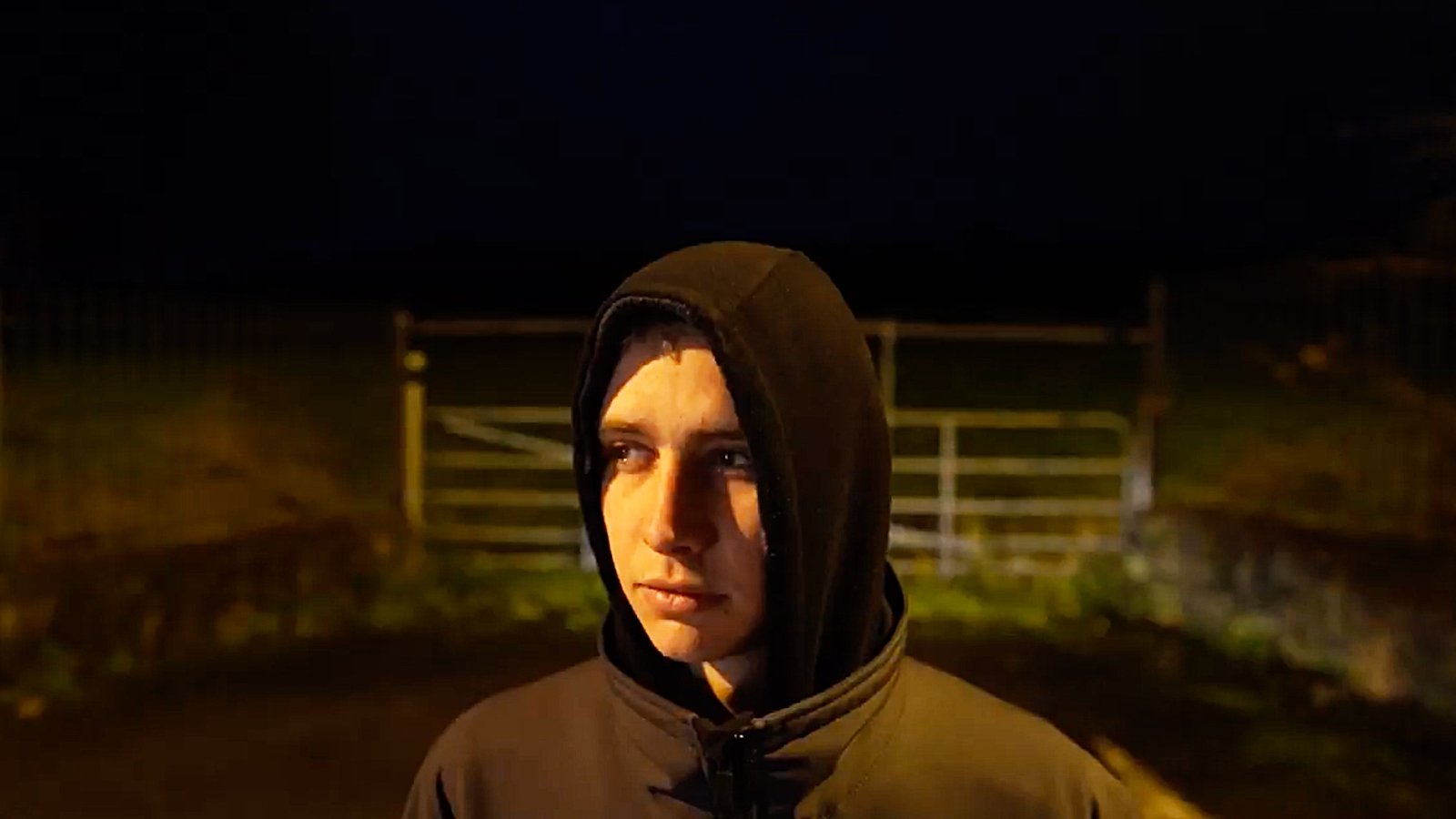
On some mornings, Dan Orlovs was forced to walk for 90 minutes to his temporary Christmas job
“I had to leave at five o’clock in the morning. At that time, there are no [public] buses going,” he said.
Some 86% of the hostel users who responded to our survey – and who may have benefitted from mental health supports – were not offered them. Almost 90% who needed help with getting off drugs were not offered rehabilitation supports.
“Without these vital supports, we’re keeping people on the rat-wheel of homelessness – where you’re constantly going around this rat-wheel and you’re not exiting out of homelessness,” said Mr Walsh from Feed Our Homeless.
Six weeks after RTÉ Investigates first met Dan, he is still struggling with his heroin addiction. But he is currently working with hostel staff with a view to securing a place of his own – through the government’s Housing First programme.
Despite the millions of euro being spent on emergency hostels and a Housing First policy, the homelessness problem in Ireland has not been solved.
“With the right level of political commitment and the redirection of the resources that are currently going into the system, it is a problem that certainly could be solved,” said Mr Allen.
But tonight, just like every night, homeless people will call the DRHE freephone number in the hope of getting a hostel bed.
Others, fearful of hostel life, will continue to sleep rough on the streets of our capital city.
